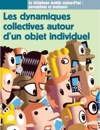French ethnographic study on teens and mobiles
This is one of the results of a recent ethnographic study conducted by the French Interdisciplinary Group on Information and Communication Process (Gripic) on behalf of the French Association of Mobile Operators, and reported at length on InternetActu (site in French).
Summarising it differently, Gripic says:
“You cannot be connected if you are afraid of failures and of DIY-ing. Once upon a time, one had to learn. Now one has to experiment. Usage is no longer something that comes at the end of a training – it is the training.”
The researchers also looked at the practice of mobile sharing:
“There is a growing trend of sharing with teenagers. Phones are more and more objects that circulate within a group, in particular when they have lost their own phone, when it is broken or stolen. The Gripic researchers were surprised to find that a fair number of teenagers didn’t even have their own mobile phone, but just a “replacement mobile”: an object that was ephemeral, non-sacred, cheap and aimed at circulation. The only thing that matters is that it works.” […]
“In fact, for adults the mobile is a hyper-personal device, an intimate black box with data that absolutely need to be protected. For teenagers on the other hand, the mobile is often as little confidential and intimate as their blogs. They are instead identity and exhibition spaces of oneself, with “museum galleries” of photos, ringtones, videos, and music to share with a community of peers: archiving makes only sense if it can be shared.”
Gripic sees teenager usage of the mobile no longer as “emblematic of an individualistic society”, but rather as “a reflection of collective and collaborative behaviours”.
Also in the study, a lot of insights on how mobile phones are used at schools and in the relationship between parents and children.
If you read French, you should read the full InternetActu post, but also check the various downloads available from the website of the French Association of Mobile Operators (ASOM).





[…] ethnographic study on teens and mobiles Posted in June 10th, 2008 by in Uncategorized French ethnographic study on teens and mobiles Afom, The fact that young people are more adapt at using the latest technologies has less to do […]
[…] interesting read from Experentia referencing a French report stating two facts enriching the perspective on youths and mobile: […]
[…] Putting people first » French ethnographic study on teens and mobiles […]
[…] (English translation from Experientia) […]
I’m a teen myself and I have exactly the same treatment for my mobile phone. More like my best friend.